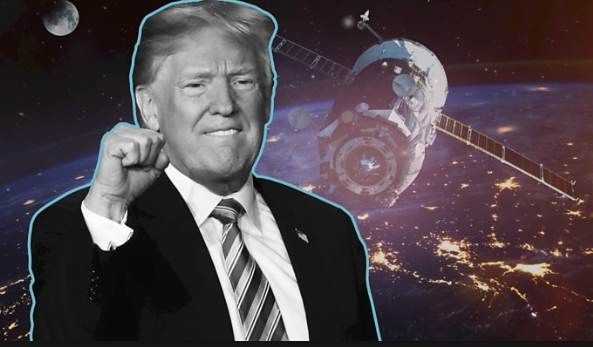Star Wars

October 18, 2018
On June 18, 2018, President Donald Trump announced an idea that has come up in the past before: The Space Force. He announced: “Because we’re doing a tremendous amount of work in space, maybe we need a new force,” he said. “We’ll call it the space force” (www.military.com). This is actually not a new topic; all of the military’s previous space operations have been overseen by the Air Force. It has been brought up by numerous presidents before, and the idea is simple: launch an all-new military branch to protect the USA’s satellites, and other assets currently residing in space. Trump has mentioned this idea before, but now has made it official, formally ordering the Pentagon to start the creation of this force in June. It looks like there is strong opposition to the idea. The UN declared some years ago that space was to be a “non-militarized zone”. This seems to have energized many people to stand up to the idea.
Why We Shouldn’t
Many reasons have arisen against the space force, the most obvious being that the aforementioned UN statement about how space “…is and shall remain a Non-Militarized Zone” (www.un.org). A space force, as the president intends it to be, would violate that. Astronaut Mark Kelly put it frankly: he thinks the space force is “A dumb idea” (www.businessinsider.com). He has held media conferences to tell the public his take and convince citizens to get together and oppose Trump’s executive order. The Air Force also seemed opposed to the idea, saying that it “can handle the duties of Space” since it has a special branch that handles all things space known as the “Air Force Space Command”, headquartered at the Peterson Air Force Base (www.airforce.com). Trump announced the Air and Space Forces would be “separate, but equal” (www.military.com).
There is economic opposition as well. The Space Force would cost $13 billion to achieve liftoff, so to speak, and may cost even more per year to maintain. Where is the government going to get this money? One way is taxes. The government would have to raise taxes significantly (about 13%) to raise the funds required. The other way the government will get the money is through loans. You probably have heard of the national debt. For those of you who don’t know, the national debt is the amount of money the government borrowed from other nations and banks, and hasn’t yet paid back. This debt grows bigger every day! This circles back to the same thing: taxes. In order to pay the money back, the government would have to raise taxes. Many people are raising the question: is it worth it?
Why We Should
On the other hand, the Space Force could be a great idea. “We need to protect our assets in Space,” Trump declared, and his comments are not unprovoked (www.military.com). China destroyed one of its weather satellites during a test in January, and this missile was able to reach the more sensitive U.S. military satellites that are stationed in high-earth orbit. President Trump realizes the dangers of having military assets within harm’s way. If China was to hit the right satellite, it could knock out all military communications, opening the US up for attack without being able to call for reinforcements. It would also affect military GPS, too, making it impossible for planes to navigate. If China was to hit one of these satellites, then launch an air attack, there would be no way for the US to defend itself except for non-satellite anti-aircraft weapons, most of which were replaced by laser guided systems, which take a lot of time to prime, or handguns. No planes, no missiles, no anti-aircraft weapons. Vulnerable, vulnerable, vulnerable. Also, space is getting too big to not keep in a separate military branch. Eventually, it has to happen. Why delay the inevitable?
All in all, there is many reasons for the Space Force, and many against. But with the executive order, will citizens have the time to decide?




